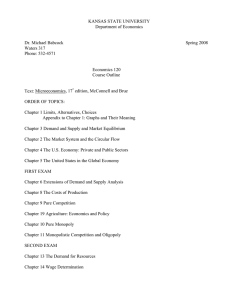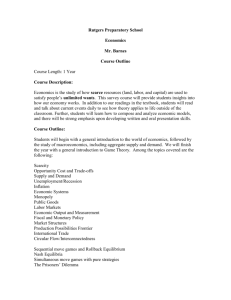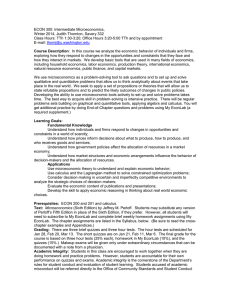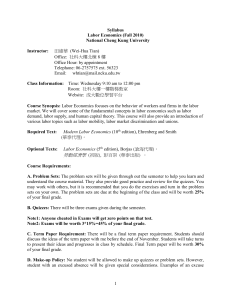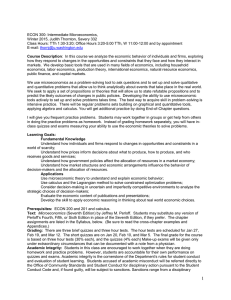Resource Economics Econ 123 Spring 2015
advertisement
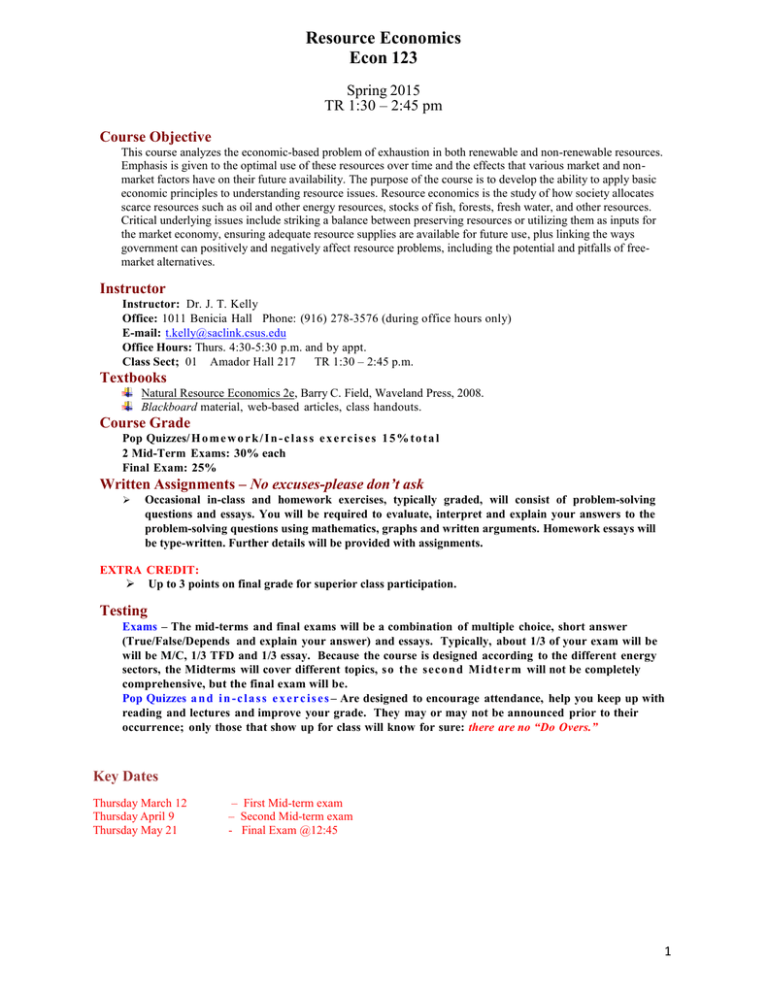
Resource Economics Econ 123 Spring 2015 TR 1:30 – 2:45 pm Course Objective This course analyzes the economic-based problem of exhaustion in both renewable and non-renewable resources. Emphasis is given to the optimal use of these resources over time and the effects that various market and nonmarket factors have on their future availability. The purpose of the course is to develop the ability to apply basic economic principles to understanding resource issues. Resource economics is the study of how society allocates scarce resources such as oil and other energy resources, stocks of fish, forests, fresh water, and other resources. Critical underlying issues include striking a balance between preserving resources or utilizing them as inputs for the market economy, ensuring adequate resource supplies are available for future use, plus linking the ways government can positively and negatively affect resource problems, including the potential and pitfalls of freemarket alternatives. Instructor Instructor: Dr. J. T. Kelly Office: 1011 Benicia Hall Phone: (916) 278-3576 (during office hours only) E-mail: t.kelly@saclink.csus.edu Office Hours: Thurs. 4:30-5:30 p.m. and by appt. Class Sect; 01 Amador Hall 217 TR 1:30 – 2:45 p.m. Textbooks Natural Resource Economics 2e, Barry C. Field, Waveland Press, 2008. Blackboard material, web-based articles, class handouts. Course Grade Pop Quizzes/ H o m e w o r k / I n - c l a s s e x e r c i s e s 1 5 % t o t a l 2 Mid-Term Exams: 30% each Final Exam: 25% Written Assignments – No excuses-please don’t ask Occasional in-class and homework exercises, typically graded, will consist of problem-solving questions and essays. You will be required to evaluate, interpret and explain your answers to the problem-solving questions using mathematics, graphs and written arguments. Homework essays will be type-written. Further details will be provided with assignments. EXTRA CREDIT: Up to 3 points on final grade for superior class participation. Testing Exams – The mid-terms and final exams will be a combination of multiple choice, short answer (True/False/Depends and explain your answer) and essays. Typically, about 1/3 of your exam will be will be M/C, 1/3 TFD and 1/3 essay. Because the course is designed according to the different energy sectors, the Midterms will cover different topics, s o th e seco n d M i d term will not be completely comprehensive, but the final exam will be. Pop Quizzes a n d i n - c l a s s e x e r c i s e s – Are designed to encourage attendance, help you keep up with reading and lectures and improve your grade. They may or may not be announced prior to their occurrence; only those that show up for class will know for sure: there are no “Do Overs.” Key Dates Thursday March 12 Thursday April 9 Thursday May 21 – First Mid-term exam – Second Mid-term exam - Final Exam @12:45 1 Resource Economics Econ 123 Estimated Schedule Spring 2015 Part Dates Topics Chapters Part 1 01/27 thru 3/5 Natural Resources and the Economy, 1,2 Supply, Demand, 3,4 Efficiency, Sustainability, and Markets 5,6 Public Policy, Natural Resource Analysis, 7,8,9 Minerals, and Energy 10,11 Forests, Fisheries, 12,13 Land, Water, Agriculture 14,15 Part 2 Part 3 3/11 thru 4/23 4/15 thru 5/15 Grades Letter Grade Percentage Performance A 93-100% Excellent Work A- 90-92% Nearly Excellent Work B+ 87-89% Very Good Work B 83-86% Good Work B- 80-82% Mostly Good Work C+ 77-79% Above Average Work C 73-76% Average Work C- 70-72% Mostly Average Work D+ 67-69% Below Average Work D 60-66% Poor Work F 0-59% Failing Work Course Structure In the Classroom — The nature of the course will be face-to-face lecture, augmented with whiteboard explanations and PowerPoint slides. Announcements — Announcements will usually be made during lectures, but sometimes also sent by email or Blackboard. Be sure your e-mail address is current with CSUS and your mailbox is not full. Responsibilities — I will come to class well prepared; respond to and encourage questions and other appropriate class participation; grade your quizzes, exams and any other assignments fairly and in as timely a fashion as possible; be available during office hours and for scheduled appointments; let you know as soon as any changes are made to the schedule, course or class meetings; and do my best to stimulate your appreciation, interest and enthusiasm for economics. The textbook brings as much humor to the study of economics as is feasible, given course material. I expect you to read the syllabus thoroughly and understand the ground rules; attend and actively participate in class; complete all the assigned readings in a timely manner; ask questions when you are lost or confused; ask questions 2 Resource Economics Econ 123 even if you fear they might be “dumb” or that you’re the only one who doesn’t get a point (believe me, you are not alone); seriously think about the material and study for and complete all quizzes, midterm and a final examination. I also expect that you will refrain from asking me to make special exceptions just for you concerning requirements laid out in this syllabus. Caveat Emptor – As you have learned by virtue of having successfully completed economics courses, economics is a discipline that is built up cumulatively, brick by brick, so is not a subject that you should let slide until the last minute, fall behind on readings or fail to ask questions as soon as you realize you don’t understand something. Ask classmates, an economics student assistant or me. Forming study groups is also a good way to learn the material. Even if you are the best student in the group, you will still learn through your efforts to explain the material to others. If at any point during the semester you are having difficulty, PLEASE come see me sooner rather than later. If you do keep up with the material, most of you can do well in the course. Exams, Assignments and Readings Credit for above-average class participation is very difficult to achieve if you are not in class. I may or may not take roll each class at or near the beginning of the lecture, so punctuality matters. Give yourself ample time to complete assignments. These assignments are challenging and important for your performance in the class. I encourage you to spend time working through them carefully and to seek out help from a classmate, an economics tutor, or me when you encounter problems. Please ask me questions if you do not understand a part of the lecture or the readings. And please ask your questions either in class or during office hours. I believe that it is particularly important that you ask your questions during the class so that other students will be able to learn from them, too. You may fear that you are the only one lost and that your questions will betray ignorance, but nothing could be farther from the truth: many, if not most, students will have the same questions but hope that they will figure it out somehow on their own. Also, the moment may pass and you’ll forget the question or the material itself. Thus it is important not to give in to the temptation to hold the question until class is just over, when everyone else and I will be departing for the next class and the next class and professor will be coming in. Pop quizzes a n d i n - c l as s ex e r c i s e s will be given approximately 3-4 times per month, usually at the beginning of class. They typically contain one short discussion question concerning either the previous lecture or an assignment made for that day. Exams are closed book and given in class. All exams are comprised of written response, true/false and multiple-choice, TFD and essay questions, requiring a large Blue Book, Scantron 882-E form. Please use a pen for the written questions and a No. 2 pencil for the Scantron questions. There are no make-up exams. If your grades are high enough, such as “A”s and “A+”s, you may be able to exempt the final exam. Free peer tutoring in economics for this class is available in the Department of Economics. Tutoring hours typically are posted in the Department office during the first week of classes. Policies • • • • • As a student in this course (and at this university) you are expected to maintain high degrees of professionalism, commitment to active learning and participation in this class and also integrity in your behavior in and out of the classroom. Academic honesty is expected. Students suspected of cheating will be reported to Judicial Affairs. There will be no makeup quizzes or examinations. Exam dates are given in the course outline. This is to avoid any potential conflicts. Attendance is both expected and highly recommended. If you miss a class, be sure to check with your fellow classmates, to see what material you missed; I recommend finding at least one “study buddy” or join a study group to facilitate information flow for exams or in case of an absence. Come to class on time; you will not be given extra time if you are late for a pop quiz or an exam. You are required to register for MEL. If you decide to withdraw from this class, make sure you do so with the registrar. If you withdraw without permission, you will be assigned a failing grade. Once a student submits work for a grade, he/she will not assigned a grade of “WU” under any circumstances. Keep mobile devices off during class, including laptops. If you wish to use your laptop during class, please come speak with me. You may not use your phone/MP3 player as a calculator on exams. You may use a calculator without programming capabilities. Keep the all your exams and quizzes and problem sets until after receiving your final grade, for future reference. I will be available by phone during office hours, so if you have questions and cannot get to my office then, please phone them in. Remember, though, I already may have students in the office. I also make appointments. 3 Resource Economics Econ 123 • • • A person with a documented illness o r o t h er val id excu s e s u ch as requ i red mi l i t ar y s ervi ce for missing one midterm exam will have the weight of his/her midterm added to their final exam. Failure to provide the required documentation within one week from the date of the exam will result to a grade of zero for the exam. No cell phones, please! If you have a learning disability or a physical disability that requires accommodation, please let me know as soon as possible. It is the student’s responsibility to provide documentation of disability to the Office of Services to Students with Disabilities (SSWD) and meet with a SSWD counselor to request special accommodation before classes start. SSWD is located in Lassen Hall 1008 and can be contacted by phone at (916) 278-6955 (Voice) (916) 278-7239 (TDD only) or via email at sswd@csus.edu. All needs that have been verified through the Services to Students with Disabilities (Lassen Hall) will be accommodated. Life Lessons If you find that you have any trouble keeping up with assignments or other aspects of the course, make sure you let me know as early as possible. As you will find in life, building rapport and effective relationships are key to becoming an effective professional. Make sure that you are proactive in informing your instructors when difficulties arise during the semester so that they can help you find a solution. Dropping this Course It is the student’s responsibility to understand when they need to consider dis-enrolling from a course. Refer to the Sac State Course Schedule for dates and deadlines for registration. After this period, a serious and compelling reason is required to drop from the course. Serious and compelling reasons includes: (1) documented and significant change in work hours, leaving student unable to attend class, or (2) documented and severe physical/mental illness/injury to the student or student’s family. 4
